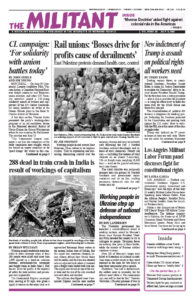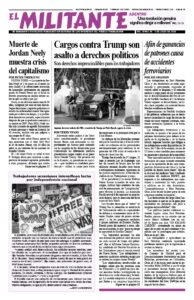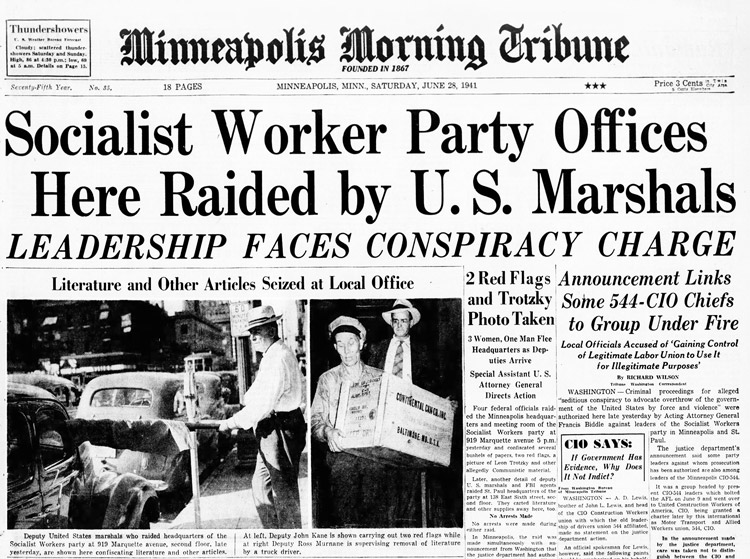As the Democrats ravage constitutional freedoms in their drive to criminalize Donald Trump to stop him from running for president again, we feature FBI on Trial as one of Pathfinder’s Books of the Month for June. It contains the results of the 15-year political and legal battle, won by the Socialist Workers Party in 1987 after forcing out the truth about decades of illegal spying, harassment and disruption by the FBI, the capitalist rulers’ political police. This victory for the working class remains a tool to defend constitutional rights today. The excerpt is from the appendix, “Workers’ rights versus the secret police.” Copyright © 1988 by Pathfinder Press. Reprinted by permission.
The secret police apparatus as we know it today began to take shape at the end of the 1930s, on the eve of the war. This is when our case begins.
Roosevelt was replacing the New Deal with the War Deal, as the imperialists prepared to subject humanity to the second world slaughter. As the U.S. capitalists got ready for war against their rivals abroad, they also prepared their offensive against the working class and against Blacks and Chicanos at home. Their aims were to silence all opponents of the war drive, to channel all motion toward a labor party back into the two capitalist parties, and to make working people accept the necessity of sacrifice. All struggles for improvements in wages and working conditions, or for an end to racial discrimination and segregation, had to be subordinated to the needs of the imperialist war.
Because they knew there would be opposition to this course, the employers decided on a big expansion of the FBI. Before this period the FBI was not primarily a political police force. …
But with the rise of the CIO and the deep-going labor radicalization, the rulers knew that their war drive would require this whole operation to be centralized, upgraded, and brought directly under federal government control. In September 1936, J. Edgar Hoover, head of the FBI, acting under instructions from President Franklin Roosevelt, informed all FBI offices that “the Bureau desires to obtain from all possible sources information concerning subversive activities being conducted in the United States by Communists, Fascists, and representatives or advocates of other organizations advocating the overthrow or replacement of the Government of the United States by illegal methods.”
By 1938, the Foreign Agents Registration Act was passed and Congress set up the Special Committee on Un-American Propaganda Activities … forerunner of the House Committee on Un-American Activities. The thought-control Smith Act and the Voorhis Act (which penalized political parties affiliated to international organizations) would be adopted in 1940. …
[W]orking people saw the results immediately. In the Teamsters union in Minneapolis and throughout the central states region, union militants began to be framed up, arrested, and convicted. In each case, the prosecutors relied on testimony from informers and agents provocateurs. In his books Teamster Politics and Teamster Bureaucracy Farrell Dobbs records the direct intervention by the FBI, beginning with the 1939 frame-up of Teamster leaders in Omaha, Nebraska, and Des Moines and Sioux City, Iowa.
This antilabor police offensive culminated in the 1941 Smith Act trial in Minneapolis, in which eighteen leaders of the Teamsters union and of the Socialist Workers Party were convicted and imprisoned for advocating forbidden ideas — the things we advocate today. In that trial, the government had three objectives:
First, to purge the labor movement of rebels who wouldn’t buy Roosevelt’s war drive and militarization, and who were campaigning against it.
Second, to wipe out the stronghold of union democracy represented by the Minneapolis Teamsters, whose leadership was spreading class-struggle methods throughout the Midwest and educating workers in the need for political independence.
Third, to drive the Socialist Workers Party underground, to make it impossible for our party to function openly, to make us give up our public existence and accept illegality.
Although with the outbreak of the war the capitalists were able to achieve a good measure of success on the first two, they totally failed in their third objective.
The large-scale entry of the FBI into the political arena began around 1938, the same year our party was founded. …
After the Smith Act convictions all of this continued. During the war, the Militant was banned for a time from the mail. After the war came the antilabor, anticommunist witch-hunt, beginning with the establishment by the Truman administration of the attorney general’s list of “subversive” organizations, an official government blacklist. Our party appeared on it from the beginning. We saw the long, vindictive government effort to victimize Jimmy Kutcher, a legless veteran of World War II who courageously insisted on his right to be a member of the SWP without losing his job or his veterans’ benefits. Passports were denied to SWP leaders in an attempt to disrupt not only our party but the Fourth International. … Our members were witch-hunted out of the maritime industry, and many workers who were members or supporters of the party in other industries were fired. …
The use of secret police, informers, agents provocateurs, frame-ups, disruption efforts, and all the other things are not incidental to capitalist rule. They are not secondary, not optional. They are permanent, basic, and essential.
This does not depend on the form of the capitalist state or the type of regime. We often say in popular explanations that the FBI uses police-state methods. This is true, of course. But the FBI methods are also the necessary methods of the political police under a bourgeois democracy. Think about this — the United States is not under fascist rule. It is not a police state. It is a bourgeois democracy, among the most democratic of capitalist regimes anywhere in the world. Yet we have here this massive undercover repressive machine, an army of secret political police. …
[T]he workers’ movement must constantly fight for its rights against this mechanism, fight to uncover it and get out the truth about it.


